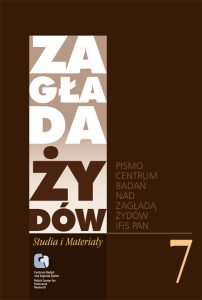
The Rescue Story
During the war, Janina (Janka) Grundgand-Kulwieć was living in Warsaw and working for the Town Gas Company when in September 1942, Edzia Fefer (later known as Yehudit Drach) who had fled to Warsaw from Ostrowiec , contacted her.
…. in the meantime, Janina procured “Arian” papers for her, in the name of Stefania (Stefcia) Janiszewska. At Edzia’s request, Janina looked after a group of friends and relatives who survived the Ostrowiec ghetto liquidation and had turned up in Warsaw. The group from Ostrowiec included:
Edzia’s brother Motek,
Renia Niskier-Szewes,
Hinda Malach-Malachi,
Basia Halbersztat-Folkman and her brother- Dawid
Helena and Cesia (Wiesia) Kleiman
Janina helped them to find a shelter, work and to obtain “Aryan” papers [Mrs. Kulwieć was a member of the Polish underground resistance army; AK- Armia Krajowa (Home Army)].
When the war ended, a few years later, Edzia together with Renia Szewes (once Niskier) have renewed their contact with Mrs. Janina Grundgand-Kulwieć. Edzia Fefer-Drach, Renia Niskier-Szewes, Hinda Malach-Malachi, Basia Halbersztat-Folkman and her brother- Dawid; immigrated to Israel.
On the 23rd of April 1975, Yad Vashem recognized Janina Grundgand-Kulwieć, her sister, Mirosława Merson, and her husband, Jerzy Merson, as a Righteous Among the Nations.
Above is based on the folllowing source .
Mode of Rescue
- Hiding
- Providing forged documents
- Arranging shelter
Rescued
- Yehudit/Edzia (Daruch) Fefer
- Motek Fefer (brother of Yehudit)
- Renia Niskier-Szewes,
- Hinda Malachi,
- Basia Halbersztat-Folkman and her brother- Dawid
- Helena and Cesia (Wiesia) Kleiman

In 2011, Ewa Teleżyńska published article : Po drugiej stronie bramy Published by: Stowarzyszenie Centrum Badań nad Zagładą Żydów & IFiS PAN
Excerpt of Abstract of the article:
...[This article] tells the story of three neighboring families domiciled on Łowicka Street in Warsaw during the war – the Palesters, the Proners and the Grundgands.
Janina Grundgand organized a whole network of flats and helpers. …The image that emerges is that of an extraordinarily brave, energetic and good woman, who not only helped to obtain papers, provided shelter and organized means of support, but also offered psychical support, self-confidence, feeling of security and hope.